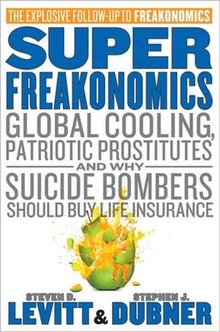SuperFreakonomics

Hardcover edition
|
|
| Author | Steven D. Levitt, Stephen J. Dubner |
|---|---|
| Country | United States |
| Subject | Economy, sociology |
| Genre | Non-fiction |
| Publisher | William Morrow |
|
Publication date
|
October 20, 2009 |
| Media type | Hardcover |
| Pages | 288 pp. |
| ISBN | |
| Preceded by | Freakonomics |
| Followed by | Think Like a Freak |
SuperFreakonomics: Global Cooling, Patriotic Prostitutes, and Why Suicide Bombers Should Buy Life Insurance is the second non-fiction book by University of Chicago economist Steven Levitt and The New York Times journalist Stephen J. Dubner, released in early October 2009 in Europe and on October 20, 2009 in the United States. It is a sequel to Freakonomics: A Rogue Economist Explores the Hidden Side of Everything.
The explanatory note states that the theme of the book explores the concept that we all work for a particular reward. The introduction states we should look at problems economically. The examples given include the preference for sons in India and the hardships Indian women face, as well as the horse manure issue at the turn of the 20th century.
The first chapter explores prostitution and pimps in South Chicago, one high class escort, and real estate brokers. The pimps and brokers are compared based on the idea that they are helping to sell one's services to the larger market. Inequalities in pay grades for men and women are also covered in the chapter.
The second chapter is about patterns and details. Patterns in the ages of soccer players, health issues of children in the womb during Ramadan, and the upbringings of terrorists are observed. Next, the book discusses the skills of hospital doctors and how Azyxxi was created, and draws parallels to how terrorists in the UK were tracked down by banks.
Altruism is discussed in the third chapter, and uses examples of the murder of Kitty Genovese, crime rates as affected by television, and economic experimental games such as Prisoner's dilemma, Ultimatum, and the work of John A. List.
The fourth chapter is about unintended consequences and simple fixes. It goes into detail about Ignaz Semmelweis' work in hospitals, use of seatbelts and child seats, and the possibility of reducing hurricanes.
...
Wikipedia
